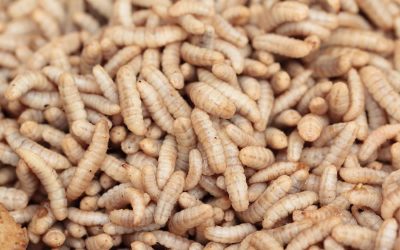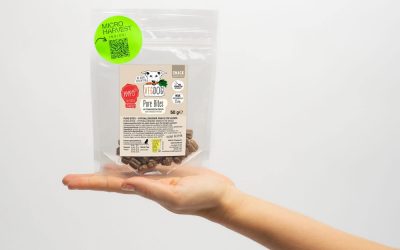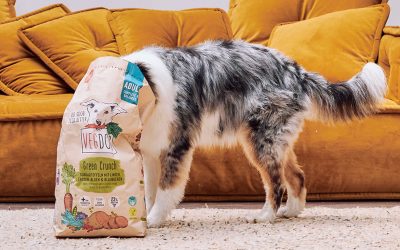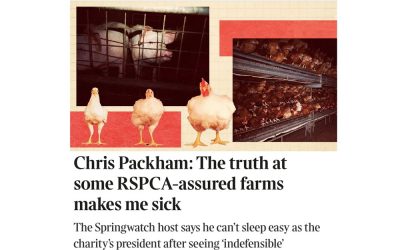The longest, most comprehensive peer-reviewed study so far has demonstrated that dogs fed nutritionally-sound plant-based diets maintain health outcomes as well as dogs fed meat
The study, published in leading scientific journal PLOS ONE, comprehensively assessed the health of 15 dogs by analysing blood cells and biochemistry, blood nutrient levels, urine, veterinary clinical parameters, and monthly pet owner questionnaires. The dogs were fed solely complete plant-based diets (V-Dog) based on pea protein for an entire year – just under one tenth of an average dog lifespan, or around seven human years.
Results after one year
Overweight or obese dogs achieved a healthier weight, whilst the remainder maintained normal weight. No clinically significant changes occurred within blood and urine. Blood levels of essential and non-essential amino acids and vitamins were all generally maintained.
In a few cases, previous deficiencies following a meat-based diet either improved or disappeared with the plant-based diet, including Taurine and L-Carnitine (important for cardiac health), Vitamin D (indispensable for immunity and bone health), and Folate (required to produce red blood cells).
The study was particularly interesting, given recent suggestions that peas might contribute to heart disease in dogs in the US. Although no credible evidence has been found, such concerns have persisted in some quarters. (Read here about Hills vets being sued for the studies on DCM in the US casting unnecessary doubt over the use of peas in dog food diets).
In this latest PLOS ONE study, dogs were fed pea-based plant-based pet food, for one year. Blood markers of cardiac health were assessed, with NO signs of heart disease found. Indeed, in some cases indicators of cardiac health improved.
Stated lead researcher, veterinarian Dr. Annika Linde from the Western University of Health Sciences near Los Angeles,
“Evolutionary adaptations have resulted in a digestive system that enables dogs to maintain health on nutritionally complete omnivorous diets, including those free of animal ingredients.
Our study offers new evidence on outcomes in clinically healthy dogs who thrive without consumption of animal-derived ingredients. Notably, foods produced independent of factory farming are also more sustainable and ethical.”
Study co-author Dr. Melgarejo highlighted the potential environmental benefits of such diets,
“If dogs and cats in the U.S. were their own nation, they would rank fifth in global meat consumption, surpassed only by Russia, Brazil, USA, and China, according to the UCLA Institute of the Environment and Sustainability.”
Veterinary Professor Andrew Knight has published several of the key studies in this field, including very large-scale studies showing that dogs normally achieve equivalent or superior health outcomes, when fed nutritionally-sound plant-based diets.
With 13 studies now demonstrating good health outcomes achieved by nutritionally-sound plant-based pet diets, and several others demonstrating major environmental benefits, a compelling case now exists for environmentally-friendly sustainable plant-based dog food diets.
Listen to Drs Annika Linde and Dr Toja speaking about their studies in a 20 minute podcast below
STUDY LINKS
– link to the study: https://doi.org/10.1371/journal.pone.0298942
This latest published paper in PLOS ONE makes 13 positive studies showing health benefits of a nutritionally sound plant-based diet for dogs which is in direct contrast to an astounding 85 papers AGAINST the use of raw feeding!
Studies claim positivity with alternative pet diets
Many owners willing to consider alternative pet diets, studies claim with a high proportion of cat and dog owners now prepared to explore alternative, more sustainable diet options
Plant-based vs Insect-based dog food
Insect Protein-Based Diets as Potential Risk of Allergy in Dogs, and Higher Cost
Avian Flu Pandemic Risk from Raw Feeding
The APHA (Animal Plant and Health Agency.gov.uk) sends anyone interested in environmental matters, emails about looming threats. As a vet, this is what I have received recently in my email inbox - In my inbox yesterday 11th November - An Avian Influenza Prevention...
Raw dog and cat food fuelling spread of antibiotic-resistant bacteria
The very real and always present danger of this latest study yet again finding antibiotic-resistant bacteria in raw commercial cat foods!
UK Petfoods MUST Keep Up!
Using animal byproducts in meat and fish-based pet foods is NOT sustainable!
Cats dying after eating Avian-Influenza-contaminated raw pet food!
Does vegan cat food provide the solution?
Fermented Protein Pet Food – the Future?
Is precision fermentation our future way to feed not only our pets, but ourselves too? Yes it most certainly is!
Could our dogs or cats trigger an avian influenza pandemic?
As our memories of the last COVID 19 disappear, the potential for another pandemic looms and pets could play a role in transmitting it
Using microbial protein for the very first time in dog treats!
This first-of-its-kind protein is derived from bacteria that have been consumed by humans for centuries in foods such as kimchi, kefir, and sauerkraut
BVA says it is possible to feed dogs plant-based
The British Veterinary Association (BVA) has ended its opposition to (nutritionally-sound) vegan diets for dogs
The truth about ‘RSPCA Assured’ farms
The footage obtained from these farms, including distressing images of decomposing pigs, dying chicks, and salmon with missing eyes, is simply indefensible
The Great Protein Debate – Beef or Beans?
Dr Sue Paterson, RCVS President and Senior Vice President of the European Society of Veterinary Dermatologists interviews Dr Arielle Griffiths about Sustainable Pet Foods














